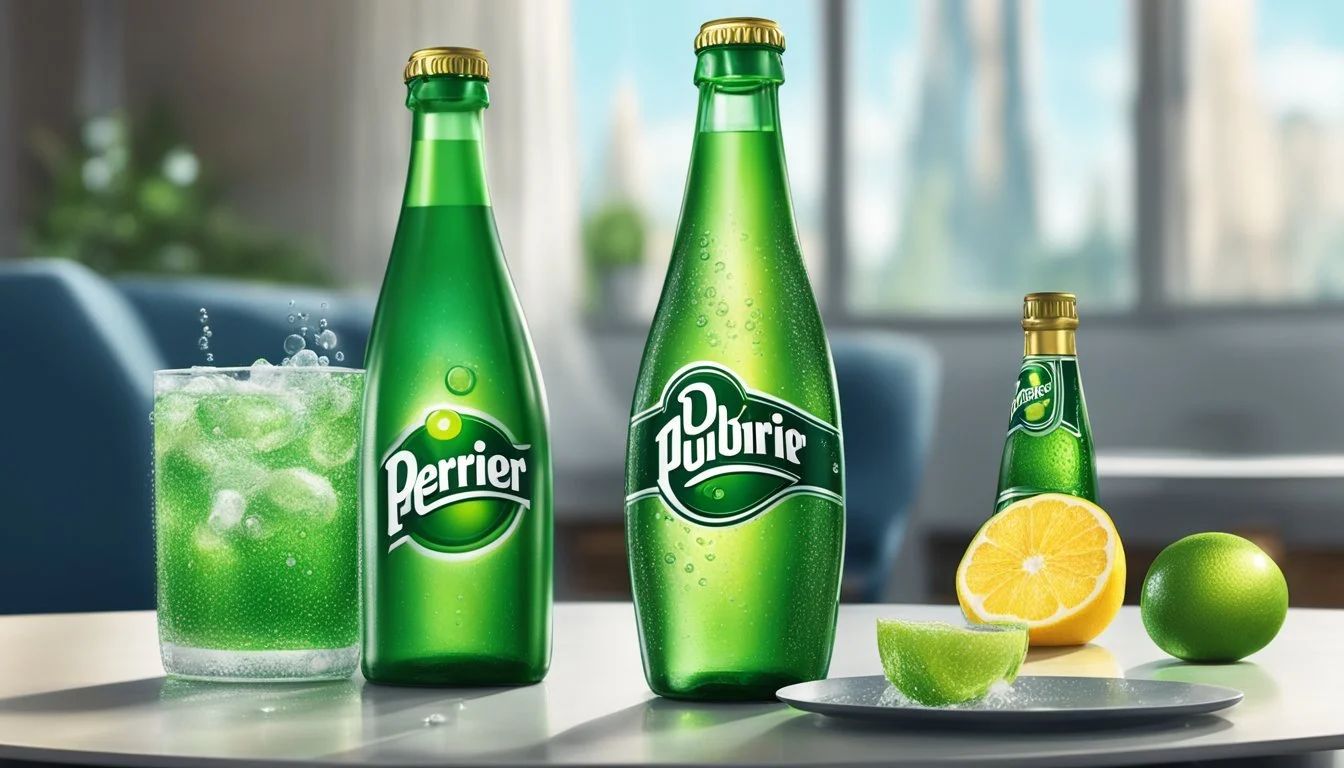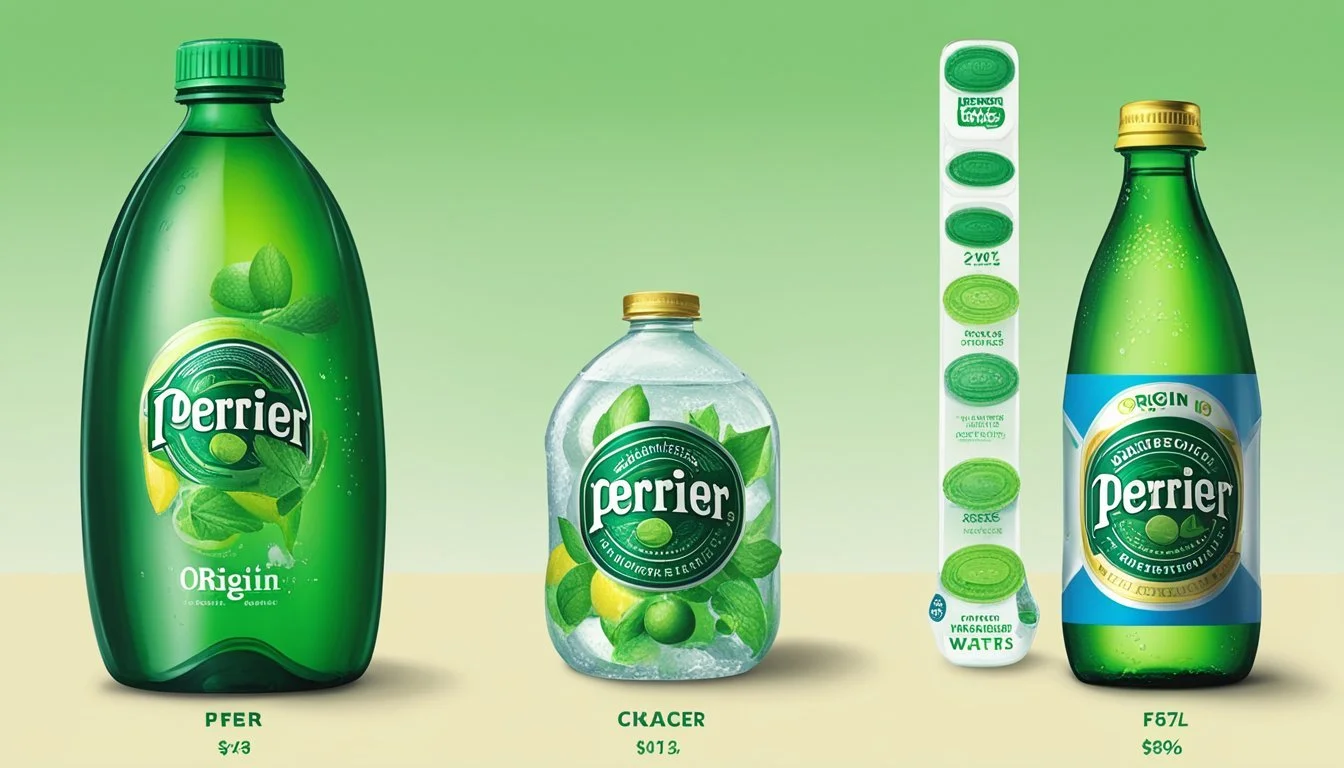Perrier vs. Origin
Comparing the Best in Bottled Water
When it comes to bottled water, the debate between Perrier and Origin often surfaces among enthusiasts and casual consumers alike. Perrier, with its sparkling texture and unique mineral flavor, has long been a favorite for those seeking a refreshing beverage with a bit of fizz. Its reputation spans over a century, bolstered by its iconic green bottle and historical significance.
Origin, on the other hand, presents itself as a no-nonsense still water option, valued for its purity and simplicity. Unlike Perrier, Origin doesn't distract with bubbles and instead offers a clean, crisp drinking experience. This makes it a popular choice for those who prioritize hydration without the additional carbonation.
For those who appreciate a sparkling sensation and a bit of historic flair, Perrier stands out as the superior choice. Conversely, if a clean, unembellished water experience is what one seeks, Origin remains unparalleled in its simplicity. This comparison hinges on personal preferences, and our detailed analysis will delve into the specifics of each to help you make an informed decision.
The Essence of Water in Hydration
Water is vital for maintaining hydration and supporting overall health. This section explores the role of water as a key nutrient and its impact on hydration.
Understanding Hydration and Health
Hydration plays a crucial role in bodily functions. It aids in regulating body temperature, maintaining skin health, and facilitating digestion. When the body is well-hydrated, it can transport nutrients more effectively. Without adequate hydration, a person can experience fatigue, headaches, and poor concentration.
Even mild dehydration can adversely affect physical performance and cognitive functions. Athletes and active individuals need to pay attention to hydration to sustain endurance and muscle function. Ensuring consistent fluid intake helps the body to operate at its optimal level.
Water as a Fundamental Nutrient
Water is an essential nutrient that the body needs daily. It doesn't provide calories but facilitates metabolic processes crucial for energy production. Unlike other nutrients, water isn't stored in the body, emphasizing the need for regular consumption.
The quality of water, including its mineral content, can influence its health benefits. For instance, mineral-rich waters like Evian and waters with natural carbonation like Perrier may offer additional benefits such as improved taste and hydration experience. They provide minerals that contribute to bone health, electrolyte balance, and overall well-being.
Staying hydrated by drinking adequate water each day can improve joint lubrication, toxin removal, and overall body function. Water is indeed the essence of life and a fundamental component in maintaining health.
Historical Background of Bottled Water
Bottled water has a rich history that spans centuries, with different regions contributing unique brands and practices to the industry. Perrier stands out as an iconic French brand, while other notable bottled waters also have deep roots and significant heritage.
Perrier: An Iconic French Brand
Perrier is synonymous with sparkling water. Originating in Vergèze, a small village in southern France, it is sourced from the well-known mineral spring Les Bouillens. The natural carbonation of the water, along with its distinctive green bottle, has made it a symbol of sophistication and purity. Perrier's market journey began in 1863 when local doctor Louis Perrier bought the spring, and it gained international fame in the 20th century.
The Heritage of Other Prominent Bottled Waters
Brands like Evian and Aquafina also play crucial roles in the bottled water industry. Evian, sourced from the French Alps, became popular due to its association with health and wellness. Introduced later, Aquafina is a purified water brand created by PepsiCo in the 1990s and is well-known for its wide availability and marketing. Both brands have significantly shaped consumer perceptions and the market landscape.
Analyzing Water Quality and Composition
When comparing Perrier and Origin, understanding their water quality and composition is essential. Key factors include mineral content, pH levels, and acidity considerations.
Mineral Content and Its Effects
Perrier and Origin differ significantly in their mineral content. Perrier is renowned for its high mineral content, especially calcium and magnesium, which contribute to its slightly salty taste. Origin, sourced from natural springs, typically has a more balanced mineral profile.
Minerals such as calcium and magnesium are essential for bone health and muscle function. Perrier’s higher mineral levels can make it an attractive choice for those seeking to supplement these nutrients. However, the higher sodium content in Perrier may not be suitable for individuals on a low-sodium diet.
pH Levels and Acidity Considerations
The pH levels of bottled water can affect its taste and how it interacts with the body. Perrier often has a pH level around 5.5, making it more acidic than Origin, which tends to hover around a neutral pH of 7.
Acidic waters like Perrier can influence the flavor profile, giving it a distinctive sharpness. On the other hand, a neutral pH level, as seen in Origin, can result in a smoother taste. It's essential for consumers to consider these differences, especially if they have sensitivities to acidity.
In summary, the mineral content and pH levels are crucial parameters that differ distinctly between Perrier and Origin, impacting their taste and potential health benefits.
The Role of Carbonation in Water
Carbonation plays a significant role in defining the taste and texture of bottled water. It's essential to understand how carbon dioxide and bubbles affect water and the differences between sparkling mineral water and still water.
Bubbles and Carbon Dioxide Impact
Carbonation introduces carbon dioxide (CO2) into water, forming bubbles that create the characteristic fizz. This process can occur naturally, as in some mineral springs, or be artificially induced.
Perrier, for example, is known for its signature effervescence, achieved by capturing CO2 during bottling. The bubbles give water a unique mouthfeel, refreshing and slightly acidic, enhancing the drinking experience.
On the other hand, tap water and still bottled water lack these bubbles, providing a completely different texture and taste profile. The presence of CO2 not only adds a visual appeal but also a distinctive tang that still waters do not have.
Comparing Sparkling Mineral Water with Still Water
Sparkling mineral water like Perrier contains natural minerals and carbonation, which can alter its taste and perceived health benefits. These minerals include calcium, magnesium, and sodium, contributing to the water’s unique flavor.
Still water, whether bottled or from the tap, generally lacks these minerals and carbonation, offering a neutral taste. Many consumers choose still water for its simplicity and absence of the effervescent sensation.
In comparing the two, the preference boils down to individual taste and the specific qualities one seeks in hydration. While some prefer the clean, unaltered taste of still water, others enjoy the lively, refreshing experience provided by the bubbles in sparkling mineral water.
Sensory Experience: Taste and Aroma
The sensory experience of bottled water varies widely, influenced by mineral content and added flavors. Understanding these elements helps to appreciate the unique characteristics of each brand.
The Diverse Range of Water Flavors
Perrier is renowned for its effervescent bubbles and crisp, clean taste. The brand also offers a variety of flavors, including lemon, lime, orange, strawberry, and pink grapefruit.
These flavors are subtly infused, enhancing the refreshing nature of the water without overpowering the palate.
Origin water, on the other hand, focuses on maintaining a pure and natural taste, often avoiding added flavors. Origin’s neutral profile appeals to those seeking hydration without any additional taste nuances. This contrast highlights the difference in sensory appeal between the two brands.
The Influence of Minerals on Taste
Mineral content significantly shapes the taste of bottled water. Perrier's water, sourced from a natural spring in France, contains a unique combination of minerals like calcium and magnesium. These minerals contribute to its slightly salty and earthy taste, which pairs well with its carbonation.
Origin water is often appreciated for its clean and neutral taste, as it undergoes minimal processing to retain its natural mineral composition. The levels of minerals like sodium, potassium, and bicarbonates in Origin water are carefully balanced to ensure a smooth and refreshing drinking experience.
By comparing the mineral compositions, one can better understand the distinct taste profiles of Perrier and Origin, aiding in the selection of a preferred water choice based on personal sensory preferences.
Comparing Source and Sustainability
Perrier and Origin are two well-known bottled water brands with differing approaches to their water sources and sustainability practices. This section explores these differences to help consumers make informed decisions.
Natural Spring Versus Aquifer Sourcing
Perrier sources its water from a protected spring in Vergèze, France, known as Les Bouillens. This natural spring has been renowned for its mineral-rich content.
Origin, on the other hand, sources its water from deep aquifers. Aquifers are underground layers of water-bearing rock from which water can be extracted through wells.
While Perrier prides itself on its unique taste, partly due to the naturally occurring carbonation, Origin highlights the purity and consistency of its water due to the depth and isolation of aquifers.
Environmental Impact and Bottling Practices
Perrier uses various bottling materials, including glass and PET plastic, both of which are recyclable. They have made strides in using recycled materials and optimizing their supply chain to reduce their carbon footprint.
However, sourcing water from a European spring and distributing it globally entails a substantial transportation footprint.
Origin sources its water closer to its primary markets, which can mean reduced transportation emissions. They also focus on using lightweight PET bottles that require less material and energy to produce and transport.
Both brands have initiatives aimed at sustainability, though Perrier’s international logistics might be an environmental drawback compared to Origin’s more localized sourcing.
Health Implications of Bottled Waters
When evaluating the health implications of bottled waters like Perrier and Origin, several factors come into play, such as their effects on digestion, nutrient absorption, and dental health. Here, we delve into these aspects to provide a clear picture of how these bottled waters may impact your well-being.
Effect on Digestion and Nutrient Absorption
Mineral water, including Perrier, contains various minerals that can affect digestion and nutrient absorption. For instance, the presence of magnesium, calcium, and sodium in Perrier aids digestive processes.
Magnesium, in particular, is known for its role in muscle function, including the muscles involved in digestion.
However, it is important to note that the carbonation in sparkling waters can cause bloating and discomfort in some individuals. This may negatively affect those with sensitive digestive systems, leading to gas or heartburn.
The pH level of the water also plays a role. While Perrier is slightly acidic, Origin’s pH balance can vary.
This may influence the gut's environment, potentially affecting the absorption of some nutrients.
Choosing water with a neutral to slightly alkaline pH may reduce digestive issues.
Dental Health and Bottled Water Consumption
The effects of bottled water on dental health largely depend on its fluoride content and acidity. Many bottled waters, including Perrier, have low or no fluoride content.
Fluoride is essential for the prevention of dental cavities.
Mineral water like Perrier, being slightly acidic, can sometimes contribute to tooth enamel erosion if consumed excessively. Acidity in drinks can weaken enamel, making teeth more susceptible to decay and sensitivity.
It is beneficial to switch up between mineral water and still water to minimize potential risks.
Additionally, rinsing the mouth with plain water after drinking sparkling water can help neutralize acids and protect dental health.
By focusing on specific factors such as mineral content, carbonation, and acidity, this section highlights the primary health considerations when choosing between Perrier and Origin bottled waters.
Economic Considerations of Bottled Waters
The bottled water industry is fiercely competitive, involving various pricing strategies and consumer preferences that influence market dynamics significantly.
Price Comparison and Consumer Choice
When comparing bottled water brands, price is a crucial factor. Perrier, with its effervescent qualities, often commands a higher price point in the market compared to still water brands.
In terms of market share and sales, Perrier holds a significant position, as indicated by its nearly $300 million in sales and 9.2% market share. San Pellegrino and Nestle Pure Life also compete strongly, with San Pellegrino achieving notable sales figures, albeit lower than Perrier.
Consumer choice is largely influenced by these price points and perceived value. Brand loyalty and preferences for specific water qualities, such as effervescence or mineral content, also play a role in purchasing decisions. The competition among high-end brands like Perrier and San Pellegrino, versus more budget-friendly options like Nestle Pure Life, reflects diverse consumer needs and economic considerations.
Culinary Applications and Pairings
Perrier and Origin both hold esteemed places in culinary settings, often chosen for their unique characteristics that can elevate dining experiences. The selection of premium waters like these can greatly influence a meal's taste profile and overall enjoyment.
The Role of Premium Waters in Dining
Premium waters such as Perrier and Origin are not just about hydration. They are selected for their ability to complement and enhance different dishes. Perrier, with its natural effervescence, works well with rich, fatty foods and can provide a refreshing contrast to spicy dishes. This makes it a popular choice in many high-end restaurants.
Origin, known for its pure and clean taste, often pairs well with lighter fare. Chefs might use it alongside delicate dishes like sushi or fine salads. Adding an elegant water choice to a meal can heighten the dining experience, showcasing the attention to detail valued in fine dining establishments.
Expert Opinions: Sommeliers on Water Selection
Sommeliers emphasize the importance of water pairing in dining. They often curate water menus to complement different wine selections, enhancing the flavors of both the water and the wine. For instance, Perrier's effervescence can cut through the richness of a heavy red wine, offering a palate cleanser between sips.
Origin, with its soft, neutral profile, is favored when the goal is to let the wine's complexities shine. Sommeliers suggest that the right water can create a harmonious balance between the food and the drink, elevating the dining experience. Understanding water's role in this context showcases a sophisticated approach to hospitality and gastronomy.
More About Perrier
Icelandic Glacial vs Perrier: Which Bottled Water is Better?
Mountain Valley Spring Water vs Perrier: Which Bottled Water is Better?
Perrier vs Kirkland Signature: Which Bottled Water is Better?
Perrier vs Richard's Rainwater: Which Bottled Water is Better?
Perrier vs Whole Foods Italian Still Mineral water: Which Bottled Water is Better?








